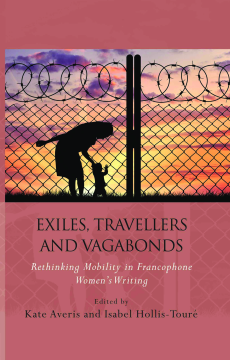
Additional Information
Book Details
Abstract
Travel writing, migrant writing, exile writing, expatriate writing, and even the fictional travelling protagonists that emerge in literary works from around the globe, have historically tended to depict mobility as a masculine phenomenon. The presence of such genres in women’s writing, however, poses a rich and unique body of work. This volume examines the texts of Francophone women who have experienced or reflected upon the experience of transnational movement. Due to the particularity of their relationship to home, and the consequent impact of this on their experience of displacement, the study of women's mobility opens up new questions in our understanding of the movement from place to place, and in our broader understanding of colonial and postcolonial worlds. Addressing the proximities and overlaps that exist between the experiences of women exiles, migrants, expatriates and travellers, the collected essays in this book seek to challenge the usefulness, relevance or validity of such terms for conceptualising today’s complex patterns of transnational mobility and the gendered identities produced therein.
Table of Contents
| Section Title | Page | Action | Price |
|---|---|---|---|
| Front Cover | Front Cover | ||
| Title Page | iii | ||
| Copyright Page | iv | ||
| Contents | v | ||
| Series Editors’ Preface | vii | ||
| Acknowledgements | ix | ||
| Notes on contributors | xi | ||
| Introduction: Rethinking Mobility in Francophone\rWomen’s Writing | 1 | ||
| Part I. Familial Frames, Transnational Tropes | 15 | ||
| Chapter 1: Strangers in their own Homes: Displaced Women in Léonora Miano’s L’Intérieur de la nuit and Contours du jour qui vient | 17 | ||
| Chapter 2: Migrant Writing in Quebec: Female Mobility in Kim Thúy’s Ru | 33 | ||
| Chapter 3: Gendering Migrant Mobility in Fatou Diome’s Novels | 54 | ||
| Chapter 4: ‘Exilées de famille’: Travelling Texts by Worldwide Women Writers | 71 | ||
| Part II. Rewriting Identities as Displaced Subjects | 91 | ||
| Chapter 5: Travelling in Trouble: Vagabondage in Isabelle Eberhardt’s Travel Writing | 93 | ||
| Chapter 6: Reappropriating ‘Exile’? Transculturality between Word and Image in Leïla Sebbar’s Mes Algéries en France | 111 | ||
| Chapter 7: Education and Exile in the Writings of Maïssa Bey and Malika Mokeddem | 131 | ||
| Chapter 8: Cross-Atlantic Mobility: The Experience of Two Shores in Fatou Diome’s Le Ventre de l’Atlantique | 153 | ||
| Chapter 9: Restarting the Stopped Clock of Time: Rethinking Mobility in Edwidge Danticat’s Non-Fiction | 169 | ||
| Part III. Future Directions in Women’s Mobility | 189 | ||
| Chapter 10: Mobility, Motility, Gender: Travelling Haiti | 191 | ||
| Chapter 11: ‘Things Coming From Every Direction’: Leslie Kaplan’s ‘Cubist’ Explorations | 212 | ||
| Chapter 12: Ectopic Literature: The Emergence of a New Transnational Literary Space in Europe in the Works of Eva Almassy and Rouja Lazarova | 232 | ||
| Afterword: Women on the Move | 249 | ||
| Index | 269 | ||
| Back Cover | Back Cover |
